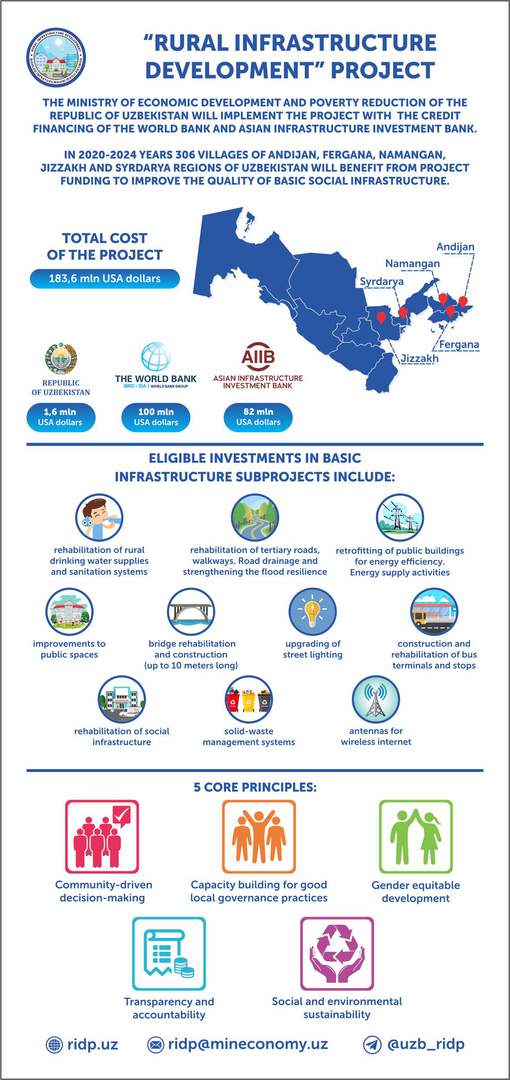
The Rural Infrastructure Development Project is considered as the first-ever CDD Project in Uzbekistan, all stages of which are implemented taking into account the opinion of the population. Community mobilization activities in 176 villages in 5 selected regions has been accomplished so far and 130 villages are waiting for community mobilization activities. Residents of 176 villages prioritized 239 subprojects. Project implementation period: 2020-2024 The Project covers 21 lagging behind districts in Ferghana, Andijan, Namangan, Syrdarya and Jizzakh regions. The population in these districts is 1 069 443. Main Executive agency/agencies: -Ministry of Economic Development and Poverty Reduction; -Project Implementation Unit -Regional administrations (khokimiyats) of Andijan, Namangan, Ferghana, Jizzakh and Syrdarya regions
1. Community-driven decision-making. The Project finances subprojects identified and prioritized by communities through participatory and inclusive social analysis that identifies communities’ development needs and presents them in the form of a Qishloq Development Plan accessible to all stakeholders. 2. Capacity building for good local governance practices. The Project supports the establishment of inclusive Mahalla Development Units that represent and give voice to all residents, including men and women, youth, the poor, and the vulnerable. It also builds the capacity of members of Mahalla Development Units and Mahalla Citizens Assemblies (both men and women) in a variety of areas, including holding participatory and inclusive meetings and decision-making processes, and managing the day-to-day development affairs of communities. In addition, the Project helps to link Mahalla Development Units to other governmental and nongovernmental agencies/organizations to improve access to services and resources. 3. Gender equitable development. The Project focuses on closing gender gaps in (i) voice and participation in village-level decision making, by ensuring that 50% of members of Mahalla Development Units are women, and through community outreach to ensure that women (including young women) are able to participate in project planning and decision-making meetings; and(ii) access to services, through subprojects that address the needs of women. 4. Transparency and accountability. The Project supports various measures to ensure transparency and accountability during implementation, including: outreach and orientation meetings at the national, regional, district, and village levels; publishing information on project implementation on its website; fostering community participatory monitoring of subproject procurement and implementation; using social audits to measure community perceptions of the quality of implementation; and establishing a grievance redress mechanism accessible to all stakeholders. 5. Social and environmental sustainability. In line with the objective of the Government of Uzbekistan of raising living standards in rural areas, the Project finances investments and activities that yield positive socioeconomic benefits for rural residents. Activities on a negative list are not supported; these include activities that involve permanent physical displacement, require forcible evictions, negatively impact residents’ incomes or livelihoods, contribute to child or forced labor, or result in environmental impacts that are large scale and irreversible. The Project supports awareness-raising efforts for local officials and communities on national laws and regulations pertaining to social and environmental safeguards, and World Bank environmental and social standards, policies and due process. The Project finances demand-driven investments in basic infrastructure and services at the local level, and local-governance capacity support. Communications and village outreach, citizen engagement, and local-governance capacity building activities support Project implementation. Qishloq facilitators and engineers provide technical assistance, training, and capacity-building to Mahalla Development Units and District Project Committees. The Project achieves the following key results: • Implement at least 300 demand-driven subprojects in basic infrastructure and services in 300 rural villages • Improve access to quality infrastructure and services for over 300,000 rural residents • Conduct approximately 918 social audits to ensure inclusive and transparent Project decisions and the accountable use of subproject funds • Strengthen the capacity of local governments (Khokimiyats) to engage communities in inclusive development processes • Link Mahalla Development Units to other governmental and nongovernmental agencies/organizations to improve access to services and resources. • Close gender gaps in voice and participation in village-level decision making, and in access to services through community subproject that address the needs of women A Grievance Redress Mechanism is available for beneficiaries or other interested stakeholders to submit any questions or concerns they may have about project implementation. Questions or concerns may be submitted through the following channels: • filling the feedback form available through the links at the top and bottom of this page • calling the telephone hotline: (71) 207 84 07 • sending a letter to the PIU office: 4, Chilanzar Street, Tashkent • sending an email to ridp@mineconomy.uz • speaking to staff in Mahalla Citizen Assemblies, district Khokimiyats, regional Khokimiyats, project facilitators, the Project Implementation Unit, or Facilitating Partners. • leaving a written note in grievances’ boxes maintained at the village, district and regional levels. In addition, the national Beneficiary Feedback Mechanism is available to report any cases of forced labor or child labor that may occur in the implementation of the Project.